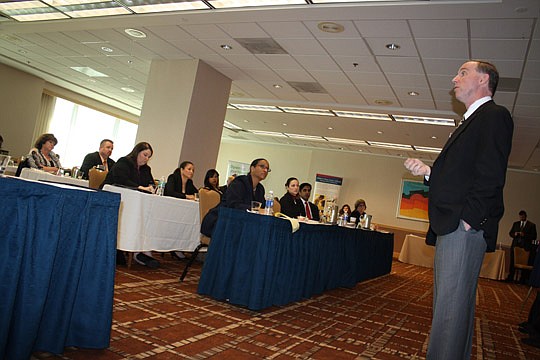
Human trafficking has been described as modern-day slavery and members of The Jacksonville Bar Association received information on its background and presence in Florida.
Terry Coonan, executive director of the Florida State University Center for the Advancement of Human Rights, was the guest speaker Wednesday at The Jacksonville Bar Association's March lunch meeting. He also took part in the association's 2013 Human Trafficking Symposium.
"What is human trafficking? We refer to it as a form of modern-day slavery that involves the exploitation of people for one of two different things, either for commercial sex or for forced labor," said Coonan.
Florida ranks third in the U.S. in human trafficking cases behind California and New York, said Coonan.
"We have seen the largest cases in the country in both of those categories right here in the state of Florida," said Coonan.
Statistics from the United Nations Global Initiative to Fight Human Trafficking show that 2.5 million people are in forced labor at any given time as a result of trafficking, 1.2 million children are annually trafficked, a majority of victims are 18-24 years of age and 95 percent of victims experience physical or sexual violence during trafficking. The U.N. estimated annual global profits made from all trafficked forced labor is $31.6 billion.
Broken down further, about $9 billion-$12 billion of that is made in the U.S., said Coonan.
"Human trafficking rivals Microsoft in what it makes annually in sheer profits. It's one of the greatest growth industries that we currently have in the world, which is a sobering statistic for all of us," said Coonan.
Following the lunch meeting, The JBA held its trafficking symposium.
The program included Telisia Espinosa telling her story of being a victim of human trafficking, a panel discussion from members of law enforcement and a presentation from Coonan.
Espinosa explained how she came from a broken home with a mother who battled addiction to crack cocaine. As a teenager, a friend convinced her that working as a stripper was a quick way to make a lot of money.
While she was working as a stripper she met a man who she would later consider her boyfriend, but she found out was her pimp. He would set up dates for her and she would bring back her earnings to him each night. He would occasionally praise her for doing well and that would be worth more than money to Espinosa.
"I was more focused on him telling me how proud of me he was than being focused on him telling me I was the first girl who did everything he told them to do," said Espinosa.
Members of the law enforcement panel agreed that one of the problems in human trafficking is that some people don't think that they are vicitims.
"I totally agree about the dynamic of family in these cases. Pimps try to fill the void because victims have come from a broken home," said Mac Heavener, Assistant U.S. Attorney for the Middle District of Florida.
"I've seen video of law enforcement officers trying to be a big brother and explain to a victim that they are being used, but they just don't believe it," said U.S. District Judge Marcia Morales Howard.
@photojoe71
(904) 356-2466